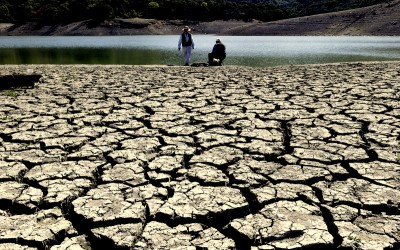Targeting Climate Change Scientists: The CSIRO Folly in Australia

Our climate and environmental scientists are some of the best in the world. We wouldn’t stop supporting our elite Olympic athletes just as they’re winning gold medals. – Andrew Holmes, President, Australian Academy of Science, Feb 9, 2016
It is hardly a popular thing to be a gloomy Cassandra, and various climate change scientists have been wondering just how far to go with being dark about the earth’s future. Each time data is released, the negativity increases. The politicians, depending on persuasion, either refuse to accept the figures on rising temperatures, or dive head long into the figures desperate to identify solutions.
NASA’s recent release of figures suggesting that February saw the biggest month-on-month rise in global warming on record has certainly induced a certain pessimism. The organisation’s calculations show that a figure of 1.35C above the long-term average was noted, more than 0.2C than January this year.
It adds to the possibility that 2016 will become the warmest year the earth has seen on human record. Some of this is explained by the large and concluding El Nino event in the Pacific Ocean, though climate change scientists insist that human inducement is unmistakable.
NASA is by no means the only scientific body to come up with such figures. Scientists at the Copernicus Climate Service have also come to the conclusion that February 2016 was the warmest month on record, finding that February was more than 5C above the 1981-2010 average for the month over a region spanning Finland to Greece, moving to western Siberia.[1] More data is set to arrive from the National Oceanic and Atmospheric Administration, and the Met Office.
For all such doom’s day activity, the troops of denial are just as well aligned against the troops enlisted in the battle against climate change. Do not, goes the argument, confuse weather with climate. Adding to this are a host of other suggestions: that the battle is being lost in terms of what is being done; and the other fundamental point on whether the climate change scientist has outlived his or her usefulness.
As if admitting the latter point, the budgetary analysts and policy makers in various countries have taken the shears to the science outlays for climate change research. In Australia, the problem is particularly acute, a point made more absurd by the fact that it stands to suffer enormously because of the effects of climate change. Administrators and the budget squirrels have decided that climate change scientists are ripe for the chop, the obsolete pessimists who did much to put the argument into focus, but have not, as yet, come up with solutions.
Australia’s main science research facility, the CSIRO, advertises itself as a body that works “to understand the role of the atmosphere in the Earth system and provide comprehensive, rigorous science to help Australia understand, respond to and plan for a changing climate.”[2] This is management-speak, pitched to audiences not necessarily aware about the razoring that is taking place within the organisation.
The announcement last month that 350 jobs would be lost from the premier Australian science institution did much to trigger the ire of both Australian and international scientists. “I am stunned by reports,” claimed Professor Penny Sackett of the Climate Change Institute at the Australian National University, “that CSIRO management no longer thinks measuring and understanding climate change is important, innovative or impactful.”[3]
The sacking sentiment was outlined by chief executive Larry Marshall, who claimed in a message to staff that the question of human-induced climate change was hardly something that should be asked anymore.
This bureaucratic initiative to cull the scientific foot soldiers came with some fanfare, suggesting that the main task had been accomplished. “Our climate models are among the best in the world and our measurements honed those models to prove global climate change. That question has been answered, and the new question is what we do about it, and how we can find solutions for the climate we will be living with?”[4]
All in all, some 2,900 scientists spanning 60 nations have appealed to the Australian Prime Minister to halt the plans in a letter stating that, “The decision to decimate a vibrant and world-leading research program shows a lack of insight, and a misunderstanding of the importance and significance of Australian contributions to global and regional climate change research.”[5]
The scepticism towards that curious creature known as the climate change scientist is hardly confined to Australia. Behind every scientist is a bureaucrat, and behind that bureaucrat is a politician. The US House Committee on Science, Space, and Technology, led by Rep. Lamar Smith (R-Texas), is an Alice in Wonderland obscenity of denial and dispute, hectoring any scientist that dares combat the narrative of climate change denial.
When Science published a paper in June last year suggesting that global warming had not experienced a “hiatus” from 1998 to 2012, Smith switched into attack mode, demanding emails and proof that the science had been manipulated.[6]
The Australian response is, in a sense, even more absurd for coming from within the scientific organisation itself. Having noted a problem, it assumes that adaptability and resilience to the most fundamental of environmental challenges will improve by removing the very personnel that helped identify that problem. The ever selfish assumption here is that the work will be done elsewhere, and the data generated in other laboratories. Such foolishness might prove to be a crime in some circles, but it is certainly the most terrible of blunders.
Dr. Binoy Kampmark was a Commonwealth Scholar at Selwyn College, Cambridge. He lectures at RMIT University, Melbourne. Email: [email protected]
Notes
[2] http://www.csiro.au/en/Research/Environment/Atmosphere-and-climate
[3] http://www.gizmodo.com.au/2016/02/top-scientists-speak-out-against-csiro-jobs-cuts/
[4] https://theconversation.com/csiro-is-poised-to-slash-climate-research-jobs-experts-react-54170
[6] http://www.sciencemag.org/content/348/6242/1469.full

